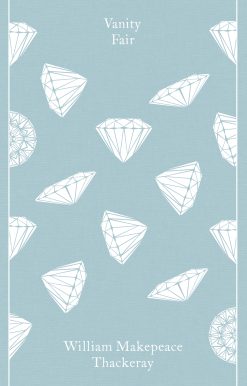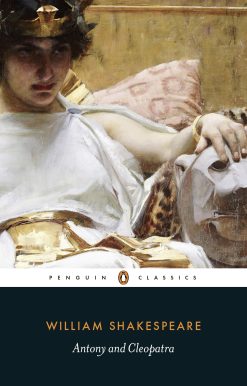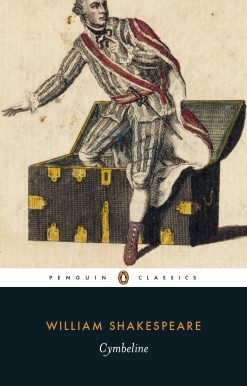Description
King Lear is Shakespeare’s bleakest and profoundest tragedy, a searing dramatization of humankind at the edge of apocalypse that explores the family and the nature of being with passion, poetry, and dark humor.Under the editorial supervision of Jonathan Bate and Eric Rasmussen, two of today’s most accomplished Shakespearean scholars, this Modern Library series incorporates definitive texts and authoritative notes from William Shakespeare: Complete Works. Each play includes an Introduction as well as an overview of Shakespeare’s theatrical career; commentary on past and current productions based on interviews with leading directors, actors, and designers; scene-by-scene analysis; key facts about the work; a chronology of Shakespeare’s life and times; and black-and-white illustrations. Ideal for students, theater professionals, and general readers, these modern and accessible editions set a new standard in Shakespearean literature for the twenty-first century.
Additional information
| Weight | 1.23 kg |
|---|---|
| Dimensions | 1.45 × 13.31 × 2.12 cm |
| PubliCanadation City/Country | USA |
| Format | |
| language1 | |
| Pages | 272 |
| Publisher | |
| Year Published | 2009-4-14 |
| Imprint | |
| ISBN 10 | 0812969111 |
| About The Author | William Shakespeare was born in Stratford-upon-Avon in April 1564, and his birth is traditionally celebrated on April 23. The facts of his life, known from surviving documents, are sparse. He was one of eight children born to John Shakespeare, a merchant of some standing in his community. William probably went to the King’s New School in Stratford, but he had no university education. In November 1582, at the age of eighteen, he married Anne Hathaway, eight years his senior, who was pregnant with their first child, Susanna. She was born on May 26, 1583. Twins, a boy, Hamnet ( who would die at age eleven), and a girl, Judith, were born in 1585. By 1592 Shakespeare had gone to London working as an actor and already known as a playwright. A rival dramatist, Robert Greene, referred to him as “an upstart crow, beautified with our feathers.” Shakespeare became a principal shareholder and playwright of the successful acting troupe, the Lord Chamberlain’s Men (later under James I, called the King’s Men). In 1599 the Lord Chamberlain’s Men built and occupied the Globe Theater in Southwark near the Thames River. Here many of Shakespeare’s plays were performed by the most famous actors of his time, including Richard Burbage, Will Kempe, and Robert Armin. In addition to his 37 plays, Shakespeare had a hand in others, including Sir Thomas More and The Two Noble Kinsmen, and he wrote poems, including Venus and Adonis and The Rape of Lucrece. His 154 sonnets were published, probably without his authorization, in 1609. In 1611 or 1612 he gave up his lodgings in London and devoted more and more time to retirement in Stratford, though he continued writing such plays as The Tempest and Henry VII until about 1613. He died on April 23 1616, and was buried in Holy Trinity Church, Stratford. No collected edition of his plays was published during his life-time, but in 1623 two members of his acting company, John Heminges and Henry Condell, put together the great collection now called the First Folio. |
| Excerpt From Book | Chapter OneAct 1 Scene 1 running scene 1Enter Kent, Gloucester and EdmundKENT I thought the king had more affected the Duke of Albany than Cornwall.GLOUCESTER It did always seem so to us: but now in the division of the kingdom it appears not which of the dukes he values most, for qualities are so weighed that curiosity in neither can make choice of either's moiety.KENT Is not this your son, my lord?GLOUCESTER His breeding, sir, hath been at my charge. I have so often blushed to acknowledge him that now I am brazed to't.KENT I cannot conceive you.GLOUCESTER Sir, this young fellow's mother could; whereupon she grew round-wombed and had indeed, sir, a son for her cradle ere she had a husband for her bed. Do you smell a fault?KENT I cannot wish the fault undone, the issue of it being so proper.GLOUCESTER But I have a son, sir, by order of law, some year elder than this, who yet is no dearer in my account, though this knave came something saucily to the world before he was sent for: yet was his mother fair, there was good sport at his making and the whoreson must be acknowledged.- Do you know this noble gentleman, Edmund?EDMUND No, my lord.GLOUCESTER My lord of Kent: remember him hereafter as my honourable friend.EDMUND My services to your lordship.KENT I must love you, and sue to know you better.EDMUND Sir, I shall study deserving.GLOUCESTER He hath been out nine years, and away he shall again. The king is coming.Sennet. Enter [one bearing a coronet, then] King Lear, Cornwall, Albany, Goneril, Regan, Cordelia and AttendantsLEAR Attend the lords of France and Burgundy, Gloucester.GLOUCESTER I shall, my lord. ExitLEAR Meantime we shall express our darker purpose.Give me the map there. Kent or an Attendant gives Lear a mapKnow that we have dividedIn three our kingdom, and 'tis our fast intentTo shake all cares and business from our age,Conferring them on younger strengths while weUnburdened crawl toward death. Our son ofCornwall,And you our no less loving son of Albany,We have this hour a constant will to publishOur daughters' several dowers, that future strifeMay be prevented now. The princes, France andBurgundy,Great rivals in our youngest daughter's love,Long in our court have made their amorous sojournAnd here are to be answered. Tell me, mydaughters -Since now we will divest us both of rule,Interest of territory, cares of state -Which of you shall we say doth love us most,That we our largest bounty may extendWhere nature doth with merit challenge? Goneril,Our eldest born, speak first.GONERIL Sir, I love you more than word can wield the matter,Dearer than eyesight, space and liberty,Beyond what can be valued rich or rare,No less than life, with grace, health, beauty, honour:As much as child e'er loved or father found:A love that makes breath poor and speech unable:Beyond all manner of so much I love you.CORDELIA What shall Cordelia speak? Love and be silent. AsideLEAR Of all these bounds, even from this line to this, Points With shadowy forests and with champaigns riched, to the mapWith plenteous rivers and wide-skirted meads,We make thee lady. To thine and Albany's issuesBe this perpetual.- What says our second daughter?Our dearest Regan, wife of Cornwall?REGAN I am made of that self-mettle as my sister,And prize me at her worth. In my true heart,I find she names my very deed of love:Only she comes too short, that I professMyself an enemy to all other joysWhich the most precious square of sense professes,And find I am alone felicitateIn your dear highness' love.CORDELIA Then poor Cordelia: AsideAnd yet not so, since I am sure my love'sMore ponderous than my tongue.LEAR To thee and thine hereditary everRemain this ample third of our fair kingdom,No less in space, validity and pleasureThan that conferred on Goneril.- Now, our joy, To CordeliaAlthough our last and least, to whose young loveThe vines of France and milk of BurgundyStrive to be interessed, what can you say to drawA third more opulent than your sisters'? Speak.CORDELIA Nothing, my lord.LEAR Nothing?CORDELIA Nothing.LEAR Nothing will come of nothing: speak again.CORDELIA Unhappy that I am, I cannot heaveMy heart into my mouth: I love your majestyAccording to my bond, no more nor less.LEAR How, how, Cordelia? Mend your speech a little,Lest you may mar your fortunes.CORDELIA Good my lord,You have begot me, bred me, loved me:I return those duties back as are right fit,Obey you, love you and most honour you.Why have my sisters husbands if they sayThey love you all? Happily when I shall wed,That lord whose hand must take my plight shallcarryHalf my love with him, half my care and duty:Sure I shall never marry like my sisters.LEAR But goes thy heart with this?CORDELIA Ay, my good lord.LEAR So young and so untender?CORDELIA So young, my lord, and true.LEAR Let it be so: thy truth then be thy dower,For by the sacred radiance of the sun,The mysteries of Hecate and the night,By all the operation of the orbsFrom whom we do exist and cease to be,Here I disclaim all my paternal care,Propinquity and property of blood,And as a stranger to my heart and meHold thee from this for ever. The barbarous Scythian,Or he that makes his generation messesTo gorge his appetite, shall to my bosomBe as well neighboured, pitied and relievedAs thou my sometime daughter.KENT Good my liege-LEAR Peace, Kent:Come not between the dragon and his wrath.I loved her most, and thought to set my restOn her kind nursery.- Hence, and avoid my sight!- ToSo be my grave my peace, as here I give CordeliaHer father's heart from her. Call France. Who stirs?Call Burgundy.- Cornwall and Albany,[Exit Attendant]With my two daughters' dowers digest the third.Let pride, which she calls plainness, marry her.I do invest you jointly with my power,Pre-eminence, and all the large effectsThat troop with majesty. Ourself by monthly course,With reservation of an hundred knightsBy you to be sustained, shall our abodeMake with you by due turn: only we shall retainThe name and all th'addition to a king: the sway,Revenue, execution of the rest,Belovèd sons, be yours, which to confirm,This coronet part between you. Gives them coronet to break in halfKENT Royal Lear,Whom I have ever honoured as my king,Loved as my father, as my master followed,As my great patron thought on in my prayers-LEAR The bow is bent and drawn, make from the shaft.KENT Let it fall rather, though the fork invadeThe region of my heart: be Kent unmannerlyWhen Lear is mad. What wouldst thou do, old man?Think'st thou that duty shall have dread to speakWhen power to flattery bows? To plainness honour'sboundWhen majesty falls to folly. Reserve thy state,And in thy best consideration checkThis hideous rashness. Answer my life myjudgement:Thy youngest daughter does not love thee least,Nor are those empty-hearted whose low soundsReverb no hollowness.LEAR Kent, on thy life, no more.KENT My life I never held but as pawnTo wage against thine enemies, ne'er fear to lose it,Thy safety being motive.LEAR Out of my sight!KENT See better, Lear, and let me still remainThe true blank of thine eye.LEAR Now, by Apollo-KENT Now, by Apollo, king,Thou swear'st thy gods in vain.LEAR O, vassal! Miscreant! Puts his hand on his sword or attacks KentALBANY and CORDELIA Dear sir, forbear.KENT Kill thy physician, and thy fee bestowUpon the foul disease. Revoke thy gift,Or whilst I can vent clamour from my throat,I'll tell thee thou dost evil.LEAR Hear me, recreant, on thine allegiance hear me!That thou hast sought to make us break our vows,Which we durst never yet, and with strained prideTo come betwixt our sentences and our power,Which nor our nature nor our place can bear,Our potency made good, take thy reward:Five days we do allot thee for provisionTo shield thee from disasters of the world,And on the sixth to turn thy hated backUpon our kingdom: if on the next day followingThy banished trunk be found in our dominions,The moment is thy death. Away! By Jupiter,This shall not be revoked.KENT Fare thee well, king: sith thus thou wilt appear,Freedom lives hence and banishment is here.-The gods to their dear shelter take thee, maid, To CordeliaThat justly think'st, and hast most rightly said.-And your large speeches may your deeds approve, To GonerilThat good effects may spring from words of love. and ReganThus Kent, O princes, bids you all adieu.He'll shape his old course in a country new. ExitFlourish. Enter Gloucester with France and Burgundy, AttendantsCORDELIA Here's France and Burgundy, my noble lord.LEAR My lord of Burgundy,We first address toward you, who with this kingHath rivalled for our daughter: what in the leastWill you require in present dower with her,Or cease your quest of love?BURGUNDY Most royal majesty,I crave no more than hath your highness offered,Nor will you tender less.LEAR Right noble Burgundy,When she was dear to us, we did hold her so,But now her price is fallen. Sir, there she stands:If aught within that little seeming substance,Or all of it, with our displeasure pieced,And nothing more, may fitly like your grace,She's there, and she is yours.BURGUNDY I know no answer.LEAR Will you, with those infirmities she owes,Unfriended, new-adopted to our hate,Dowered with our curse and strangered with ouroath,Take her or leave her?BURGUNDY Pardon me, royal sir:Election makes not up in such conditions.LEAR Then leave her, sir, for by the power that made me,I tell you all her wealth.- For you, great king, To FranceI would not from your love make such a strayTo match you where I hate, therefore beseech youT'avert your liking a more worthier wayThan on a wretch whom nature is ashamedAlmost t'acknowledge hers.FRANCE This is most strange,That she whom even but now was your object,The argument of your praise, balm of your age,The best, the dearest, should in this trice of timeCommit a thing so monstrous to dismantleSo many folds of favour. Sure her offenceMust be of such unnatural degreeThat monsters it, or your fore-vouched affectionFall into taint, which to believe of herMust be a faith that reason without miracleShould never plant in me.CORDELIA I yet beseech your majesty -If for I want that glib and oily artTo speak and purpose not, since what I will intendI'll do't before I speak – that you make knownIt is no vicious blot, murder, or foulness,No unchaste action or dishonoured stepThat hath deprived me of your grace and favour,But even for want of that for which I am richer:A still-soliciting eye and such a tongueThat I am glad I have not, though not to have itHath lost me in your liking.LEAR Better thou hadstNot been born than not t'have pleased me better.FRANCE Is it but this? A tardiness in nature,Which often leaves the history unspokeThat it intends to do? My lord of Burgundy,What say you to the lady? Love's not loveWhen it is mingled with regards that standsAloof from th'entire point. Will you have her?She is herself a dowry.BURGUNDY Royal king, To LearGive but that portion which yourself proposed,And here I take Cordelia by the hand,Duchess of Burgundy.LEAR Nothing: I have sworn: I am firm.BURGUNDY I am sorry, then, you have so lost a father To CordeliaThat you must lose a husband.CORDELIA Peace be with Burgundy.Since that respect and fortunes are his love,I shall not be his wife.FRANCE Fairest Cordelia, that art most rich being poor,Most choice forsaken, and most loved despised,Thee and thy virtues here I seize upon:Be it lawful, I take up what's cast away. Takes her handGods, gods! 'Tis strange that from their cold'st neglectMy love should kindle to inflamed respect.-Thy dowerless daughter, king, thrown to my chance,Is queen of us, of ours and our fair France:Not all the dukes of wat'rish BurgundyCan buy this unprized precious maid of me.-Bid them farewell, Cordelia, though unkind.Thou losest here, a better where to find.LEAR Thou hast her, France: let her be thine, for weHave no such daughter, nor shall ever seeThat face of hers again. Therefore be goneWithout our grace, our love, our benison.Come, noble Burgundy.Flourish. Exeunt. [France and the sisters remain]FRANCE Bid farewell to your sisters.CORDELIA The jewels of our father, with washèd eyesCordelia leaves you. I know you what you are,And like a sister am most loath to callYour faults as they are named. Love well our father:To your professèd bosoms I commit him,But yet, alas, stood I within his grace,I would prefer him to a better place.So farewell to you both.REGAN Prescribe not us our duty.GONERIL Let your studyBe to content your lord who hath received youAt fortune's alms. You have obedience scanted,And well are worth the want that you have wanted.CORDELIA Time shall unfold what plighted cunning hides:Who covers faults, at last with shame derides.Well may you prosper.FRANCE Come, my fair Cordelia. Exit France and CordeliaGONERIL Sister, it is not little I have to say of what most nearly appertains to us both. I think our father will hence tonight.REGAN That's most certain, and with you: next month with us.GONERIL You see how full of changes his age is: the observation we have made of it hath not been little. He always loved our sister most, and with what poor judgement he hath now cast her off appears too grossly.REGAN 'Tis the infirmity of his age: yet he hath ever but slenderly known himself.GONERIL The best and soundest of his time hath been but rash. Then must we look from his age to receive not alone the imperfections of long-engrafted condition, but therewithal the unruly waywardness that infirm and choleric years bring with them.REGAN Such unconstant starts are we like to have from him as this of Kent's banishment.GONERIL There is further compliment of leave-taking between France and him. Pray you let us sit together: if our father carry authority with such disposition as he bears, this last surrender of his will but offend us.REGAN We shall further think of it.GONERIL We must do something, and i'th'heat. ExeuntAct 1 Scene 2 running scene 2Enter Bastard [Edmund] With a letter |
| series |
Only logged in customers who have purchased this product may leave a review.






Reviews
There are no reviews yet.